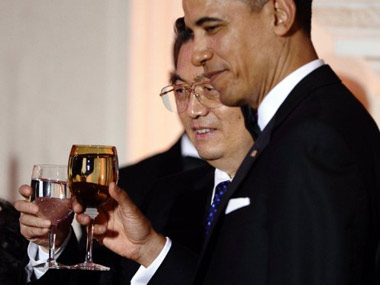Ladies and gentlemen, welcome to the new Cold War, the greatest show on earth. Over in the right corner stands the US, the prizefighter who won the previous Cold War but now nurses a bloodied nose. In his time, he waged valorous battles — and fought dirty wars — in continents far and near; built up the largest, most awesome military-industrial complex; slowly whittled down the mighty Soviet empire; and savoured the fruits of the American century. But today, he’s well and truly bankrupt, and were it not for his raging hormones (and a mean left hook), and the fact that he still has some ardent fans, he would have been forced into retirement. But he’s now come out for what could be his last big fight. And over in the left corner is China, the newest kid on the block, a streetfighter who has financially muscled his way into the heavyweight category in double-quick time but has earned a bad press as the bully of his neighbourhood. He considers Asia to be his backyard, his “turf”, which he has earned the Mandate of Heaven to dominate. For that reason, he is deeply resentful of the US prizefighter’s swagger and tough talk on his terrain. Who will prevail in this epic battle? The aged, battle-scarred warrior, who is living off his past — or the hard-as-nails newbie who ‘owns’ him? Sit back, and enjoy the show. [caption id=“attachment_133630” align=“alignleft” width=“380” caption=“US’ stance is a turnaround since 2009, when Obama walked on eggshells to avoid hurting Chinese sensibilities. AFP Photo”]  [/caption] When US president Barack Obama announced in Canberra earlier this morning that he was refocussing US military attention in the Asia-Pacific region, he was in effect sounding the bugle cry for a new Cold War – this time with China. Setting up a de facto military base in Australia, Obama said America was “here to stay” as a Pacific power that would help shape the region’s future. Even the enforced cuts in US defence spending – as it draws down its military in West Asia after a decade and more of waging unwinnable wars that bankrupted it – would not inhibit the US from expanding its military footprint in the Asia-Pacific, he said. “Reductions in US defence spending will not — I repeat, will not — come at the expense of the Asia Pacific,” he said. Although Obama did not specifically identify China as the target of America’s reassertion of itself as a Pacific power – in fact, he pointedly said the moves were not intended to isolate China – it’s evident that his patience with China has run its course. Just the other day, Obama urged China to “grow up” and act responsibly on the world stage. That’s quite a turnaround since 2009, when during a visit to China, Obama walked on eggshells to avoid hurting Chinese sensibilities and enlist its leaders’ help in addressing geopolitical issues — notably Iran and Afghanistan. At the end of that trip, US interlocutors even sold India short, giving China overseer rights in South Asia. The Globocop was about to hand over the baton to China and allow it to police its neighbourhood. Yet, Obama met with stubborn Chinese unwillingness to play ball, evidently because Chinese leaders sensed America’s economic weakness. And over the past two years, that pushback from China has only intensified. And China’s bullied neighbours have been lining up to beg the US to return as a foil to China. Which accounts for why the US is now reinjecting itself into the region. Yet, if the previous Cold War between the US and the erstwhile Soviet Union holds any lessons, it is that for all the proxy wars the two superpowers waged, they never squared off militarily face to face. The Soviet empire crumbled under the economic burden of the proxy wars it waged and the satellite states it propped up. In that sense, the Cold War was won on the economic and ideological battleground. And although the parallels are not as striking, today it is the US that is economically enfeebled and militarily overstretched. Its most severe damage was inflicted not by a nation-state but by ragtag jihadi terrorists who poked it in the eye and stoked its military madness. And all the while that the US sent its troops to far-off continents to wage wars, China has been single-mindedly building up its industrial and military prowess. There’s no certainty about how long this Cold War will play out or how it will end, but as the saying goes, when elephants fight, it is the grasslands that suffer. Brace for proxy wars between the new combatants in the new Cold War in unlikely geographies. But mark this day in history as the day when the new Cold War was officially flagged off.
The refocussing of US military attention in the Asia-Pacific manifestly targeting China is the surest sign of a coming showdown between yesterday’s Globocop and the rising challenger.
Venky Vembu attained his first Fifteen Minutes of Fame in 1984, on the threshold of his career, when paparazzi pictures of him with Maneka Gandhi were splashed in the world media under the mischievous tag ‘International Affairs’. But that’s a story he’s saving up for his memoirs… Over 25 years, Venky worked in The Indian Express, Frontline newsmagazine, Outlook Money and DNA, before joining FirstPost ahead of its launch. Additionally, he has been published, at various times, in, among other publications, The Times of India, Hindustan Times, Outlook, and Outlook Traveller. see more


)

)
)
)
)
)
)
)
)



